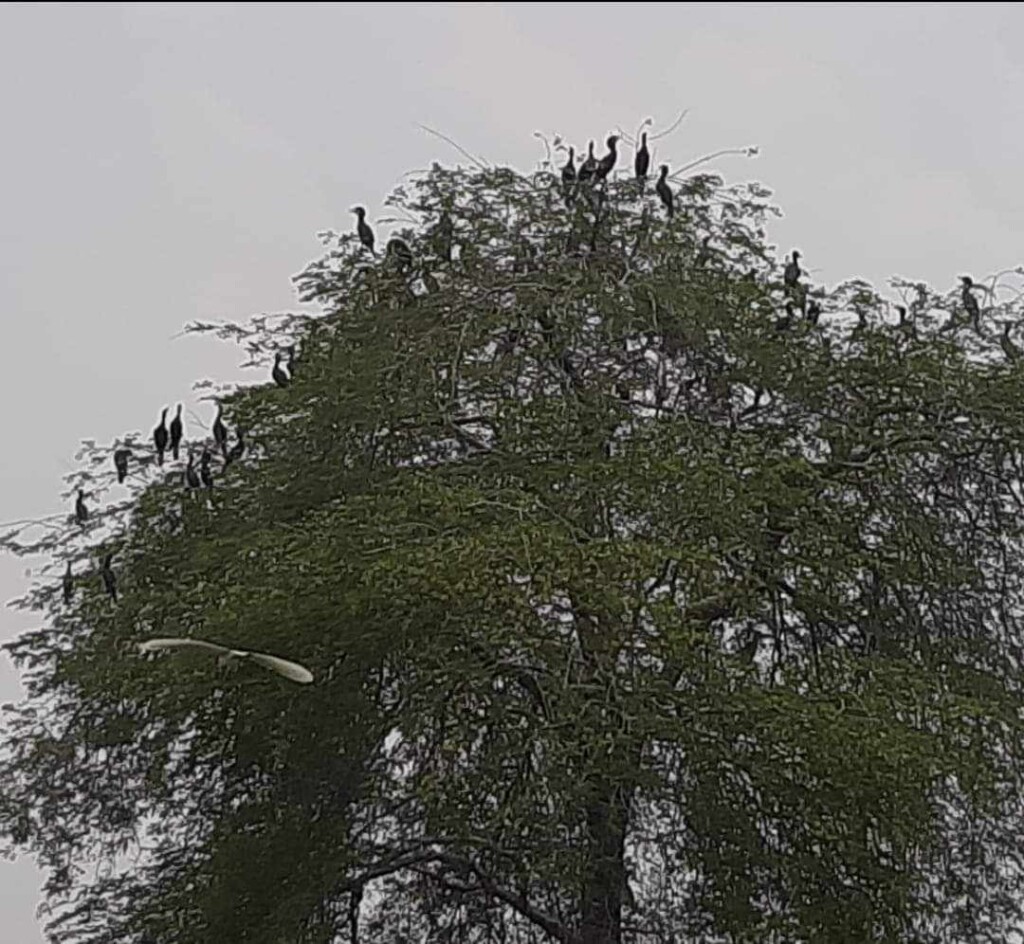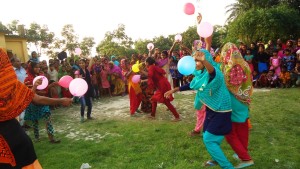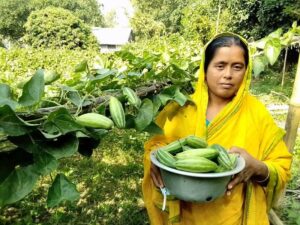By Amit Sorkar, from Rajshahi
‘Birds starts to chirp when the dawn comes up!
The flowers also start to bloom keeping pace with them.
Then the shepherds start with their heard!
And children concentrate on their studies!’
These lines of the poet Madanmohan Tarkalanka seem to coincide with Barenda village of Nejampur union of Nachol upazila, Rajshahi.
This village’s bamboo groves and trees resemble heaven and serve as a sanctuary for birds. Large groups of migrating birds visit this area each winter. Birds chirping is an ongoing loud noise. Flamingo lovers go great distances to witness this captivating spectacle. It will appear to be a bird’s paradise when you would view the flock of birds.
With the brisk winter wind, the tree leaves tremble. The reservoir’s water is stagnant. A swarm of visiting birds gathers. Their chirping filled the surroundings. Flocks of these vibrant visitor birds build their nests in this country’s reservoirs, beels, haors, and ponds every year when winter arrives. After 10 years, the visiting birds have made Barenda their permanent home. They are no longer considered visitors in this hamlet.
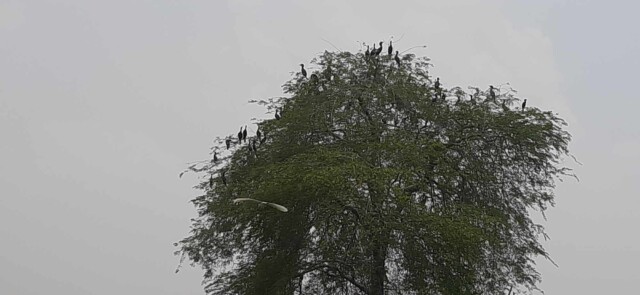
However, there used to be no such secure bird habitat in this village. Since 2010, Bangladesh Resource Center for Indigenous Knowledge (BARCIK) has collaborated several projects to guarantee disadvantaged people’s access to natural resources in this region. White bucks, who were passing through the village in the winter, used to settle in the bamboo grove. These birds were slaughtered and eaten by some villagers and outsiders.
At the end of winter, the birds would leave again. Since then, there has been a Bird Act awareness campaign in this village. The campaign emphasizes on how birds are beneficial to crops and how crucial they are in maintaining our ecosystem. In 2012, the hamlet organized a bird conservation committee, with Munsur Rahman serving as president. However, the committee proclaimed their village a bird sanctuary.
BARCIK created a signboard called Bird Colony and presented it to the committee. Since then, no one can come and kill birds in the community, and the residents have acquired a fondness for birds. They do not kill birds, nor do they allow others to do so. The birds also began to feel safer. The number of birds in the village increased day by day. The birds now live throughout the village.
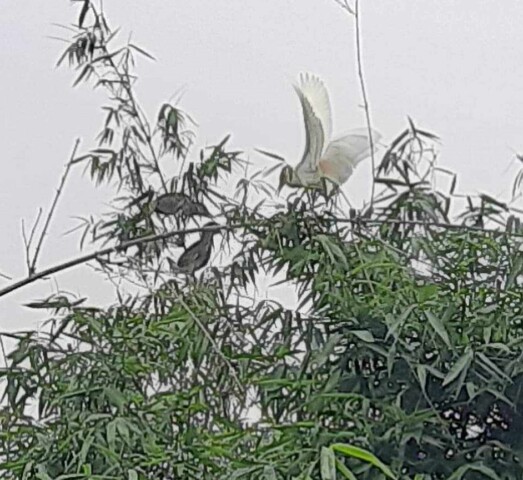
In this regard, Md. Mansur Rahman (60+) stated that after visiting and living for numerous years, various kinds of guest birds began settling permanently in the hamlet in 2014. He said, ‘To keep them safe, we formed village committees to prevent bird hunting making the entire community a bird sanctuary. Birds are our dearest buddies. A companion of the crop.’
He went on saying, ‘Birds are quite beneficial. BARCIK made us alert to these problems on the courtyard meeting. Now the banks of the village pond and the dighi, hundreds of bucks, ducks, pankauri, shalikh, tiya, doel, myna, maschranga, dove, and shaama are now nesting on the branches of shimul, jam, neem, mango, mahogany trees, branches, and bamboos.’ ‘Numerous indigenous and foreign bird species, such as the Cuckoo, Tuntuni, and Sparrow are also available. Because of our village’s secure environment, good food supply, and acceptable climate, they now reside there permanently. Some birds, on the other hand, are migratory; they only stay during the winter’ he added.
Razia Sultana (over 35) moved by marriage to Barenda village fifteen years ago from Dinagar village in Amunura, a nearby hamlet. She claimed that after getting married, she used to witness the white-buck birds arriving from the north to build a nest in the bamboo garden adjacent to the home before winter. At the end of the winter, the newborn gets up and depart. Many people caught and consumed the large birds when they initially appeared. The village came to an agreement to cease the killing of birds. The killing of birds has ceased ever since. Birds are now found throughout the year. The entire hamlet is gradually turning into a home of bird.
Birds now permanently reside in this community. The house smells dirty from bird droppings, yet the people appreciate the constant sound of birds singing more than disliking it. It is common for people to purchase birds with cash and keep them in cages so that they can hear their sounds constantly. Family members visit this village to see the birds. In the midst of so much love, a little filth and stench don’t feel so horrible.
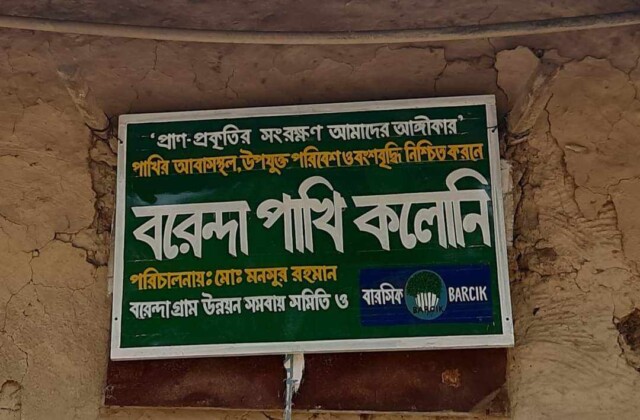
According to Abdul Halim, a 55-year-old farmer who lives in this region, ‘birds provide us with several benefits. By consuming the insects in our crops, birds are serving humanity a big service. Nowadays, 10% or less of the medication is needed to control insects in crops, compared to 20% previously. The birds are our allies. Everyone is delighted to see the birds and hear their sounds, even distant relatives and friends who travel great distances to visit our community.
If the thieves arrive late at night the birds start to scream. Nobody trims the shrubs or trees in our village where the birds make their nests. The villagers and the bird have developed a bond. Nobody says anything as they go down and sit on the house. No one in the hamlet is upset if the bird urinates. Nearby villages uninvite birds so they don’t feel secure there. However, there are birds all throughout our village. When we get up in the morning, the sound of their chirping overwhelms our mood.
Every year, Barenda village has a rise in the number of birds. People become fascinated by the sound of the flock of birds in morning and evening. The bamboo groves, trees, and shrubs of many buildings in the hamlet appeared to be a bird’s paradise from outside. There are birds singing everywhere you look!
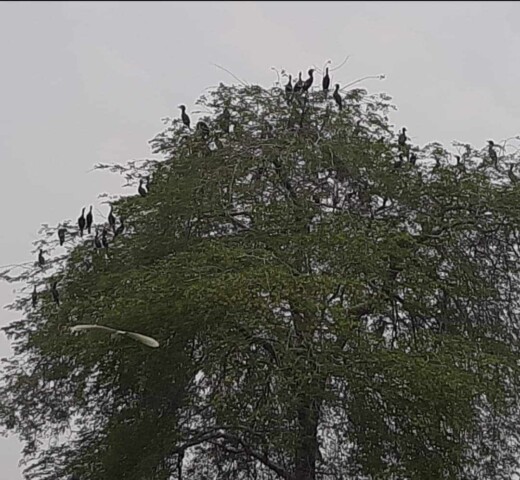
Some fly from one branch to another, while others fly from one bamboo shoot to another or one tree to another. From inside the nest, the chick cries out. They are being fed by their mothers. While some of the birds are producing eggs, others are building their nests inside of their hearts. Birds are securely coexisting with people in close proximity. The villagers have an unrivaled fondness for birds now a days. It can never be fully comprehending the depth of the connection that has grown between humans and birds unless witnessing it.
Currently, the push to create new cities and villages by cutting old trees is causing the birds to lose their habitat because of the flashing of digital lights.
Some selfish humans are preying on a lot of birds. The preservation of our ecosystem is greatly aided by birds. In terms of bird protection, the residents of Barenda hamlet are now leading by example.
Translated by Shaheda Purna

